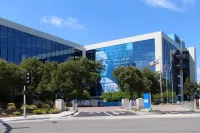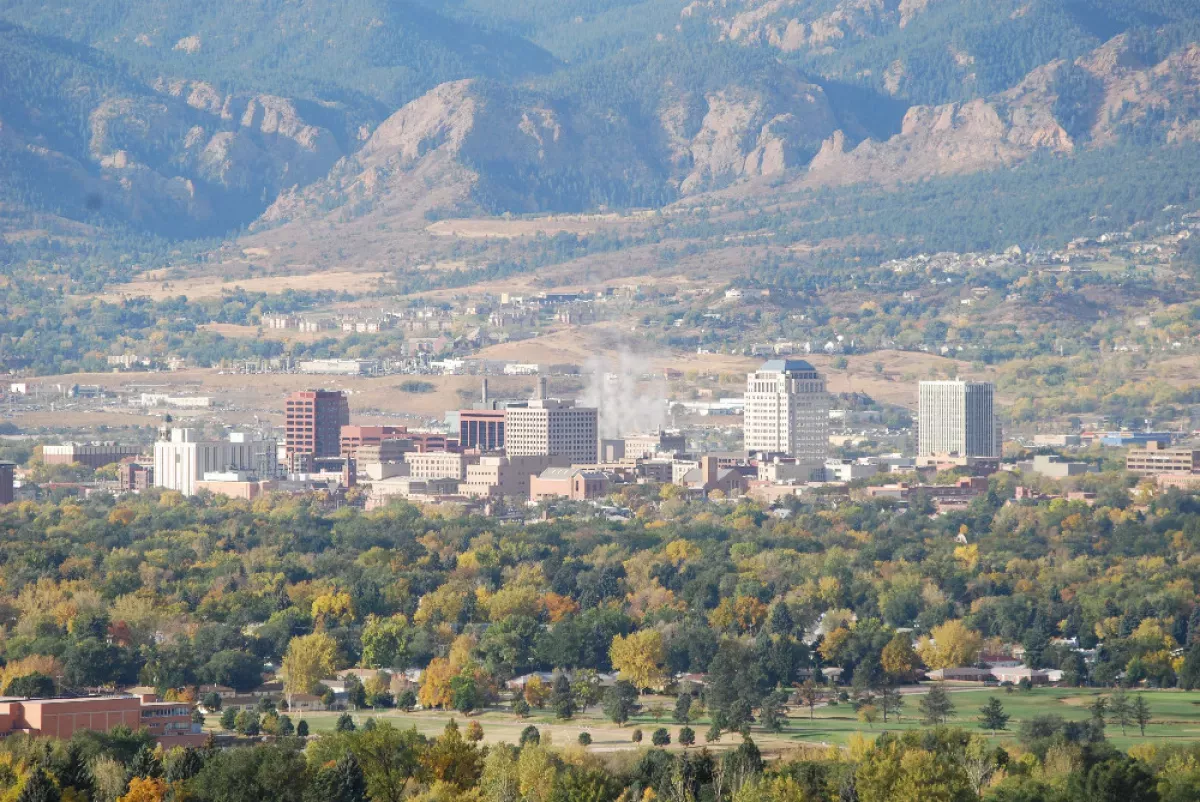Colorado Springs is the second-most populous and largest city in Colorado, with a population of 478,961 in 2020, marking a 15.02% increase since 2010. It serves as the principal city of its metropolitan area, which had 755,105 residents in 2020. Located in east-central Colorado on Fountain Creek, it's situated 70 miles south of Denver. It is also the county seat of El Paso County.
1901: End of Tesla Experimental Station
In 1901, the Tesla Experimental Station ceased operations on Knob Hill.
1902: Start of City Hall Construction
In 1902, construction of the Colorado Springs City Hall began on land donated by W. S. Stratton.
1904: Completion of City Hall
Colorado Springs City Hall, built on land donated by W. S. Stratton, was completed in 1904.
December 9, 1919: Extreme Temperature
On December 9, 1919, Colorado Springs reached an extreme temperature of −27 °F (−33 °C).
1919: Start of aircraft flights
In 1919, aircraft flights to the Broadmoor's neighboring fields began.
1925: Colorado Springs Airport in Operation
Colorado Springs Airport has been in operation since 1925, making it the second-largest commercial airport in Colorado.
1927: Purchase of land for Colorado Springs Municipal Airport
In 1927, land was purchased east of Colorado Springs for the original Colorado Springs Municipal Airport.
1941: Establishment of Camp Carson
In 1941, Camp Carson, now known as Fort Carson, was established, marking the beginning of the city's military presence during World War II.
December 1942: Naming of Peterson Field
In December 1942, the United States Army Air Forces leased land adjacent to the municipal airfield and named it Peterson Field.
November 1950: Selection of Ent Air Force Base as ADC Headquarters
In November 1950, Ent Air Force Base was selected as the Cold War headquarters for Air Defense Command (ADC).
February 1, 1951: Extreme Temperature
On February 1, 1951, Colorado Springs reached an extreme temperature of −27 °F (−33 °C).
1951: Re-opening of Peterson Field
In 1951, Peterson Field, a former WWII Army Air Base, was re-opened as a U.S. Air Force base.
1965: Establishment of University of Colorado Colorado Springs
In 1965, the University of Colorado Colorado Springs was established in or near the city.
1968: Establishment of Colorado Technical University
In 1968, Colorado Technical University was established in or near the city.
1970: Population Statistics
In 1970, the White (non-Hispanic) population was 86.6% of the population and the Hispanic or Latino population of any race was 7.4% in Colorado Springs.
1971: Amtrak Formation
In 1971, the formation of Amtrak led to the cessation of the remaining intercity passenger services connecting the Front Range cities.
1977: Ent AFB becomes US Olympic training center
In 1977, most of the former Ent Air Force Base became a US Olympic training center.
October 1, 1981: Annexation of areas after court decision
On October 1, 1981, the Broadmoor Addition, Cheyenne Canon, Ivywild, Skyway, and Stratton Meadows were annexed after the Colorado Supreme Court overturned a decision.
1990: Population Statistics
In 1990, Mexican Americans made up 9.1% of Colorado Spring's population.
1992: Founding of Professional Bull Riders (PBR)
In 1992, Colorado Springs was the original headquarters of the Professional Bull Riders (PBR) from its founding.
1999: Agilent spin-off from HP
In 1999, Agilent was spun off from HP as an independent, publicly traded company.
1999: Flooding in Colorado Springs
In 1999, Colorado Springs experienced flooding, leading to unusually low precipitation in the subsequent years.
2000: High-tech employment
In 2000, the high-tech sector in the Colorado Springs area employed around 21,000 people.
2002: Enactment of lawn water restrictions
In 2002, Colorado Springs enacted lawn water restrictions due to several years of unusually low precipitation after flooding in 1999.
2004: Pikes Peak Rural Transportation Authority Established
In 2004, the voters of Colorado Springs and El Paso County established the Pikes Peak Rural Transportation Authority.
2005: Move of Professional Bull Riders (PBR) headquarters
In 2005, the Professional Bull Riders (PBR) organization was moved from Colorado Springs to Pueblo.
2005: Lifting of water restrictions
In 2005, the lawn water restrictions enacted in 2002 were lifted in Colorado Springs.
2006: High-tech employment
From 2000 to 2006, the high-tech sector in the Colorado Springs area decreased its overall presence from around 21,000 to around 8,000 employees.
2006: Bankstown TAP Performance
In 2006, the Bankstown TAP (Talent Advancement Program) performed with the Youth Symphony and the Colorado Springs Children's Chorale as part of the annual "In Harmony" program.
September 2008: Annexation of Nielson Addition and Vineyard Commerce Park
In September 2008, the city expanded through annexations, including the Nielson Addition and Vineyard Commerce Park Annexation.
November 2, 2010: Adoption of council-strong mayor form of government
On November 2, 2010, Colorado Springs voters adopted a council-strong mayor form of government.
2010: Population Statistics
As of the 2010 United States census, 78.8% of the population of the city was White, 16.1% Hispanic or Latino, 6.3% Black or African American, 3.0% Asian, and 1.0% descended from indigenous peoples of the Americas.
2010: Approval of I-25 bypass
In 2010, an Interstate 25 bypass was approved.
2010: Bankstown TAP Performance
In 2010, the Bankstown TAP (Talent Advancement Program) performed with the Youth Symphony and the Colorado Springs Children's Chorale as part of the annual "In Harmony" program.
2011: Walk Score Ranking
A 2011 study by Walk Score ranked Colorado Springs as the 34th most walkable of the fifty largest U.S. cities.
2011: Transition to council-strong mayor government
In 2011, the City of Colorado Springs transitioned to the new council-strong mayor system of government.
2011: Paving of Pikes Peak Highway
In 2011, the Pikes Peak Highway was completely paved.
June 23, 2012: Waldo Canyon Fire
On June 23, 2012, the Waldo Canyon fire began 4 miles (6.4 km) northwest of Colorado Springs, destroying 347 homes, killing two people, and leading to the evacuation of over 32,000 residents. At the time, it was the most destructive fire in state history.
June 26, 2012: Extreme Temperature
On June 26, 2012, Colorado Springs reached an extreme temperature of 101 °F (38 °C).
2012: Approval of Colorado Amendment 64
In 2012, Colorado voters approved Colorado Amendment 64, a constitutional amendment legalizing retail sales of marijuana for recreational purposes.
April 2013: North Korean propaganda video target
In April 2013, a North Korean propaganda video singled out Colorado Springs as one of four targets for a missile strike, though it incorrectly pinpointed the location on the map in Louisiana.
2014: Keysight Technologies spin-off
In 2014, Keysight Technologies was spun off from Agilent, which was itself spun off from HP in 1999.
2014: Medical marijuana sales
In 2014, medical marijuana clinics in Colorado Springs reported sales of $59.6 million, up 11 percent from the previous year.
2015: Medical marijuana clinics
In 2015, there were 91 medical marijuana clinics in Colorado Springs.
April 26, 2016: Extension of marijuana moratorium
On April 26, 2016, the Colorado Springs city council decided to extend the current six-month moratorium to eighteen months, with no new licenses to be granted until May 2017.
June 21, 2016: Extreme Temperature
On June 21, 2016, Colorado Springs reached an extreme temperature of 101 °F (38 °C).
December 2016: Bike Lane Removed on Research Parkway
In December 2016, the City of Colorado Springs removed a bike lane along Research Parkway due to overwhelming opposition, as indicated by an online survey.
2016: Political vibe
In 2016, downtown Colorado Springs had a different political vibe from the overall area's and that there were "superficial signs of changing demographics".
May 2017: End of marijuana moratorium extension
In May 2017, the eighteen month moratorium on new licenses to be granted until May 2017, decided by Colorado Springs city council on April 26, 2016, came to an end.
2017: Bike Lanes and Paved Trails in Colorado Springs
As of 2017, Colorado Springs had 121 miles of bike lanes and 82 miles of paved trails, along with the PikeRide electric bike-share program operating in various areas.
2017: Politico article on Colorado Springs
In 2017, Caleb Hannan wrote in Politico that Colorado Springs was "staunchly Republican" and "the fourth most conservative city in America".
March 1, 2018: Status of marijuana outlets
As of March 1, 2018, there were 131 medical marijuana centers and no recreational cannabis stores in Colorado Springs.
April 2018: Bike Master Plan Approved
In April 2018, the Colorado Springs City Council approved a Bike Master Plan to promote bicycling as a safe and convenient transportation option.
2018: Tourism Statistics
In 2018, 23 million day and overnight visitors came to the Colorado Springs area, contributing $2.4 billion in revenue.
February 25, 2019: "Battle of the Bike Lanes" Town Hall
On February 25, 2019, The Gazette hosted a town hall meeting called "Battle of the Bike Lanes" due to immense public interest and argument over the city's Bike Master Plan.
June 2019: Unemployment Rate Before COVID-19
In June 2019, before the COVID-19 pandemic, the unemployment rate in Colorado Springs was 3.3%.
December 2019: Reinstatement of lawn water restrictions
In December 2019, Colorado Springs permanently reinstated lawn water restrictions due to unusually low precipitation.
2019: Limited Marijuana Legalization
As of 2019, Colorado Springs is still one of seven towns that have only allowed for medical marijuana.
2020: Colorado Springs area in 2020
As of the 2020 United States census, the city of Colorado Springs had a total area of 195.761 square miles (507.019 km²).
2020: Population statistics in 2020
As of the 2020 United States census, the population of the city of Colorado Springs was 478,961, the population of the Colorado Springs Metropolitan Statistical Area was 755,105, and the population of the Front Range Urban Corridor was 5,055,344.
2020: Opening of United States Olympic & Paralympic Museum
In 2020, the United States Olympic & Paralympic Museum opened in Colorado Springs. Also in 2020, the Flying W Ranch Chuckwagon Dinner & Western Show reopened.
2020: Population of Colorado Springs in 2020
In 2020, the census recorded the population of Colorado Springs as 478,961, which made it the second-most populous city in Colorado and the 40th-most-populous in the United States. The Colorado Springs metropolitan area had 755,105 residents in 2020.
2020: Shift towards political center
Since 2020, Colorado Springs has continued to shift towards the political center.
2021: Military presence in 2021
As of 2021, there are nearly 45,000 active-duty troops in the Colorado Springs area. There are more than 100,000 veterans and thousands of reservists.
2021: Opening of Pikes Peak Summit Complex and reopening of Manitou and Pikes Peak Railway
In 2021, the new Pikes Peak Summit Complex opened at the 14,115-foot (4,302 m) summit. The Manitou and Pikes Peak Railway also reopened in 2021.
June 2022: Unemployment Rate
In June 2022, the state's unemployment rate was 3.4% compared to 3.6% for the nation.
2022: Governor Polis wins the city
In 2022, Governor Jared Polis won the city in his bid for reelection.
2022: Airport Handled Over 2 Million Passengers
In 2022, the Colorado Springs Airport handled 2,134,618 passengers and is served by several airlines.
2023: Fiber-Optics Connections
As of 2023, high-tech corporations offering fiber-optics to the premises connections within the city include Lumen Technologies and Comcast.
2023: Front Range Passenger Rail Proposal
As of 2023, the Front Range Passenger Rail is a proposal to link cities from Pueblo to Fort Collins, possibly extending to Cheyenne, Wyoming.
2023: Election of the first non-Republican mayor
In the 2023 mayoral election, independent candidate Yemi Mobolade handily won the race and became the first elected non-Republican mayor of the city.
Mentioned in this timeline

Apple Inc founded in and headquartered in Cupertino California is...

An apple is a widely cultivated round edible fruit originating...
Japan is an East Asian island country located in the...
Australia officially the Commonwealth of Australia encompasses the Australian mainland...

Intel Corporation is a multinational technology company based in Santa...
Alabama is a state in the Southeastern United States bordered...
Trending

56 minutes ago Robby Fabbri Joins Minnesota Wild After Waiver Claim From St. Louis.

56 minutes ago Dave Mustaine Reflects on Metallica's Impact and Megadeth's Success; Lomenzo on 'Ride the Lightning'

56 minutes ago Commanders Release Marshon Lattimore: $18.5M Saved, Four-Time Pro Bowler Released.

2 hours ago Giannis Antetokounmpo Expected to Return Against Celtics After Injury, Bucks Upgrade Status
2 hours ago Pisa vs Bologna: A Fierce Serie A Battle and Hiljemark's Motivational Charge

3 hours ago Taylor & Travis: Wedding date predictions and planning updates spark excitement!
Popular

Jesse Jackson is an American civil rights activist politician and...

Hillary Diane Rodham Clinton is a prominent American politician lawyer...

Jim Carrey is a Canadian-American actor and comedian celebrated for...

XXXTentacion born Jahseh Dwayne Ricardo Onfroy was a controversial yet...

Kashyap Pramod Patel is an American lawyer who became the...

Barack Obama the th U S President - was the...
